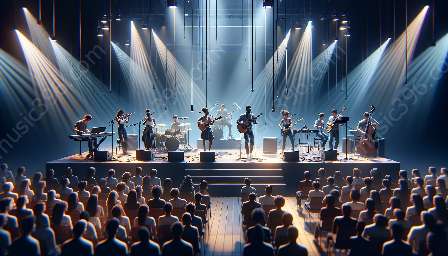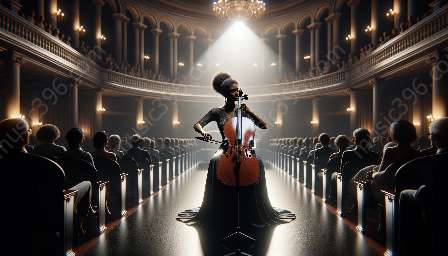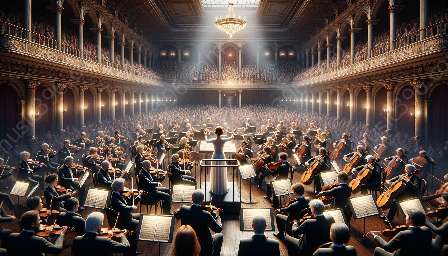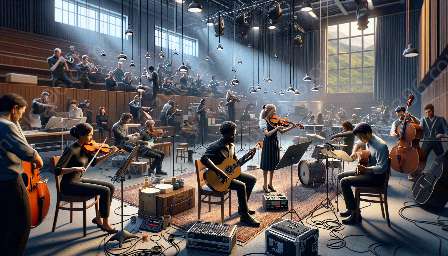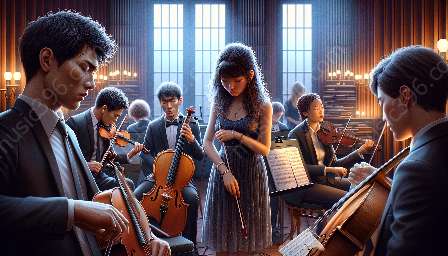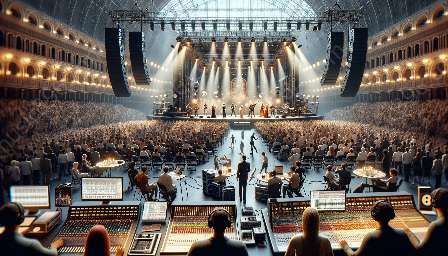Music has the power to convey a wide range of emotions, and in a solo performance, this emotional expression becomes even more pronounced. Understanding the role of emotion in solo music performance is essential for musicians to connect with their audiences on a deeper level. This topic cluster will explore the impact of emotions on musical interpretations, the portrayal of emotions through music, and how solo performers can effectively convey and harness emotions in their performances.
The Essence of Emotion in Music
Music is a universal language that transcends cultural and linguistic barriers. At the core of music lies emotion, which is the driving force behind the ability of music to evoke powerful feelings and resonate with listeners. Whether it's the melancholy strains of a soulful ballad or the exhilarating crescendo of a triumphant march, emotions are the heartbeat of music.
In a solo performance, the soloist is tasked with not only playing the correct notes and rhythms but also communicating the emotions embedded within the piece. The ability to convey these emotions effectively can elevate a performance from a mere recitation of notes to a deeply moving and immersive experience for the audience.
Interpreting and Expressing Emotions through Music
Emotions in music are conveyed through a myriad of elements, including dynamics, phrasing, timing, and tone color. A skilled solo performer harnesses these elements to mold and shape the emotional landscape of a musical piece, crafting a narrative that speaks directly to the hearts and minds of the listeners.
Each musical composition carries its own emotional story, and it is the soloist's task to interpret and articulate these emotions through their performance. For example, the haunting sorrow of a piece by Chopin demands a different emotional approach than the jubilant exuberance of a Mozart sonata. Understanding the nuances of each musical emotion and translating them into an expressive performance requires a deep understanding of both the composition and the emotional intent behind it.
The Impact of Emotion on Musical Interpretations
Emotions significantly influence the way listeners perceive and connect with a musical performance. A solo performer who effectively conveys emotions can transport the audience on an emotional journey, eliciting profound and personal responses from the listeners. This emotional connection fosters a powerful bond between the performer and the audience, creating a shared experience that transcends the boundaries of the performance space.
Furthermore, emotions play a pivotal role in shaping the interpretation of a musical piece. The emotional state of the performer directly influences the delivery and nuances of the performance. A soloist who is deeply connected to the emotional core of a piece can imbue their playing with an authenticity and depth that resonates with the audience on a profound level.
Conveying Emotion in Solo Performances
Conveying emotion in a solo performance requires a multifaceted approach that encompasses technical proficiency, emotional intelligence, and a profound connection to the musical material. A solo performer must master the technical aspects of their instrument or voice to effectively communicate the intended emotional content of the music.
Moreover, developing emotional intelligence and self-awareness is crucial for solo performers, as they must be attuned to their own emotional state and be able to channel those emotions into their performance. This deep connection to their own emotions allows performers to infuse their playing with sincerity and authenticity, creating a profoundly moving experience for the audience.
Connecting with the Audience through Emotional Expression
In a solo performance, the interaction between the performer and the audience is heightened, making the emotional connection even more crucial. As the soloist shares their emotional journey through music, the audience reciprocates with their own emotional responses, creating a symbiotic exchange of feelings and experiences.
Through skillful emotional expression, a solo performer can facilitate a profound and cathartic experience for the audience, allowing them to immerse themselves in the shared emotional landscape created by the music. This interplay of emotions forms the foundation of a deeply impactful solo performance, forging an emotional bond that lingers long after the final notes fade away.
In Conclusion
Emotional expression is the lifeblood of music, and in a solo performance, the role of emotion becomes magnified, shaping the very essence of the musical experience. By understanding the impact of emotions on musical interpretations, the portrayal of emotions through music, and the profound connection with the audience, solo performers can harness the power of emotions to create performances that resonate deeply with listeners.


